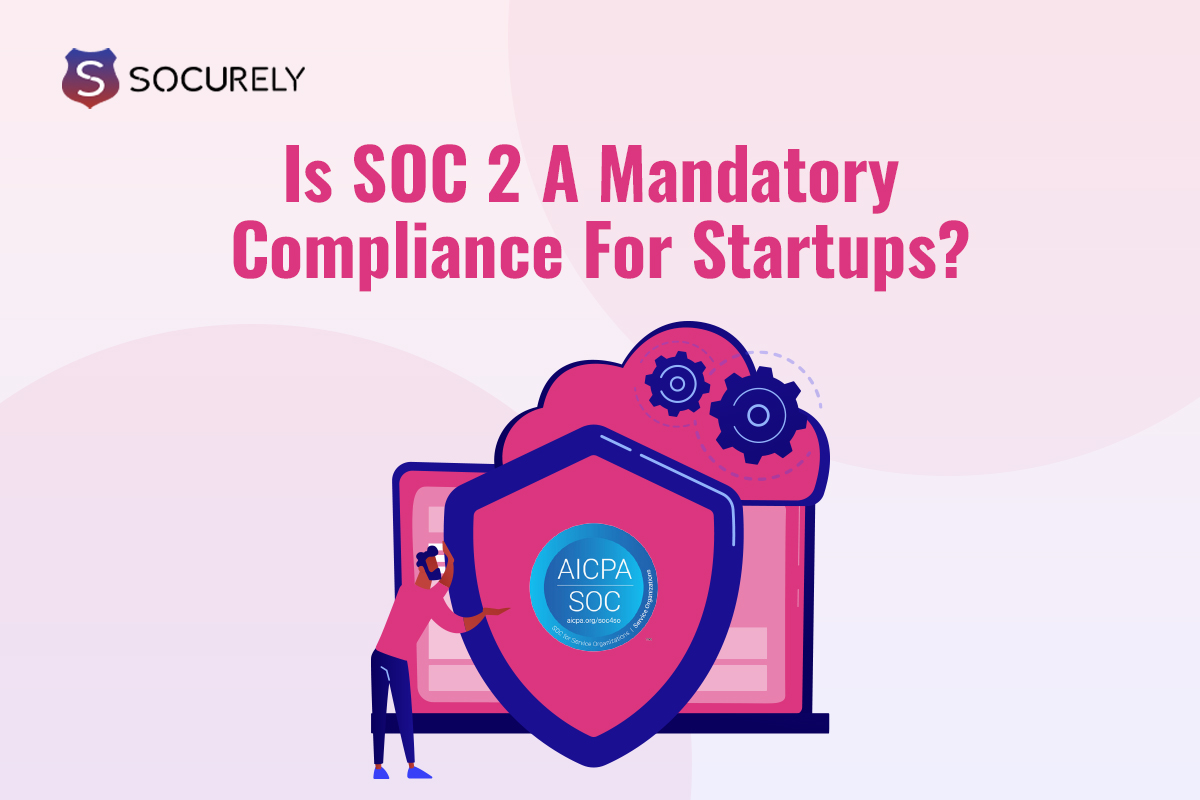The primary distinction between SOC 2 and other security compliance frameworks (such as ISO27001 or PCI DSS) is that SOC 2 is not a certification. Furthermore, SOC 2 differs from ISO 27001 in that it includes two distinct attestation levels or observation durations.
But the question remains, is SOC 2 necessary for startups?
Startups, often operating with lean resources and tight budgets, might overlook the importance of robust compliance frameworks like SOC 2. However, achieving SOC 2 compliance can be a game-changer for startups, providing a competitive edge, enhancing customer trust, and paving the way for sustainable growth.
This guide delves into why SOC 2 compliance is essential for startups, what types of startups can benefit from it, and how to navigate the compliance journey effectively.
Why Startup Should Consider SOC 2?
Startups are synonymous with innovation and agility, but this often comes with vulnerabilities in data security, which hampers the revenue. Also, every company wants to make money, and one of their goals is to get rid of everything that stands in the way of their revenue development. And it is one of the key justifications for pursuing SOC 2. In actuality, no security framework will remove every obstacle or difficulty in establishing confidence with potential customers, but having something—almost anything—certainly helps.
For startups, having a SOC 2 will facilitate discussions with the security teams of potential customers and may even remove the need for an audit, which would simplify continuing customer support.
Here’s why startups should prioritize SOC 2 compliance:
- Customer Trust and Confidence: In an era where data breaches are increasingly common, having SOC 2 compliance can significantly boost customer confidence. It shows that your startup is committed to data security and privacy, fostering trust and loyalty.
- Market Differentiation: SOC 2 compliance sets your startup apart from competitors who may not have such robust security measures in place. This can be a critical differentiator in crowded markets.
- Regulatory Compliance: As startups scale, they often expand into markets with stringent data protection regulations. SOC 2 compliance ensures that you meet various regulatory requirements, avoiding potential legal pitfalls.
- Operational Efficiency: The process of achieving SOC 2 compliance necessitates a thorough review of your internal controls and processes, leading to improved operational efficiency and risk management.
- Investment Attraction: Investors are increasingly prioritizing startups with strong data security frameworks. SOC 2 compliance can make your startup more attractive to potential investors, demonstrating your commitment to safeguarding data.
Note- For any small organization in North America, ISO 27001 certification may be sufficient in some circumstances, but generally speaking, ISO 27001 is more often accepted and mandated outside of the US. It is because many US-based corporations are involved in the market that SOC 2 has become more and more popular in Europe over the last five years. Outside of these two major markets, however, requests for SOC 2 compliance are not as frequent.
However, SOC 2 is the most required framework that allows rapid maturity of the security program.
What Type Of Startup Can Benefit From SOC 2 Compliance?
SOC 2 Report might not be very important for a business-to-consumer enterprise. The majority of customers are unlikely to request a SOC 2 audit report from a company before doing business with them. To aid with fulfilling all of the many customer data privacy obligations that exist, it might still be helpful to build a robust set of controls and procedures. While it won’t appease them or demonstrate adherence to the data privacy laws, it will undoubtedly provide the groundwork for fulfilling the obligations.
A SOC 2 report, or a comparable report, is a basic need for any SaaS-based, or more critically, business-to-business, organization.
While all startups can benefit from enhanced data security, certain business types are particularly forced for SOC 2 compliance:
- Tech Startups: Startups offering software as a service (SaaS), cloud services, or IT infrastructure can greatly benefit from SOC 2 compliance. It assures clients that their data is secure and handled with the highest standards.
- Healthcare Startups: Companies dealing with sensitive patient data need to comply with stringent regulations like HIPAA. SOC 2 compliance complements these requirements, ensuring comprehensive data protection.
- Fintech Startups: Handling financial transactions and sensitive customer information makes SOC 2 compliance crucial for fintech startups. It helps mitigate risks and assures customers of data integrity and security.
- E-commerce Startups: With the increasing prevalence of online shopping, e-commerce startups handle vast amounts of customer data. SOC 2 compliance ensures that this data is protected, enhancing customer trust and loyalty.
Also, apart from this other industries like banking, finances, insurance, investments, and business partnered with 100 Fortune companies should consider SOC 2 Compliance Report.
Not just startups of the same business background can benefit. SOC 2 Compliance framework also satisfies and protects large businesses or enterprises.
When Startups Should Think Of SOC 2 Compliance?
Timing is critical when considering SOC 2 compliance. Here are key milestones indicating it’s time to prioritize compliance:
- Scaling Operations: As your startup grows and attracts more customers, the volume of data handled increases. This is an ideal time to implement SOC 2 compliance to ensure robust data security.
- Entering New Markets: Expanding into new markets often brings regulatory challenges. Achieving SOC 2 compliance before entering these markets ensures you meet the necessary data protection standards.
- Securing Investment: When seeking investment, having SOC 2 compliance can be a decisive factor for investors. It demonstrates your commitment to data security and reduces perceived risks.
- Client Demands: If prospective clients require SOC 2 compliance as a prerequisite for doing business, it’s a clear sign that you should prioritize it to secure new contracts.
Apart from the key areas to implement SOC 2 Compliance, the reality is any business should consider security using the SOC 2 Compliance framework from the start. However, due to the lack of enough operational budget or personnel, this becomes more feasible.
Apart from SOC 2 Compliance, the SOC 2 reports also depend on the 5 TSC (Trust Service Criteria).
A company might achieve that far faster if it just focuses on the Security TSC than if it includes additional TSC in the audit. Typical things that must be looked at while SOC 2 Audit process-
- Management, reporting, and improvement monitoring of security programs
- Program for risk management
- Tracking, identification, and inventory management technique or procedure
- The process or technique for access management that covers rights auditing, offboarding, and onboarding
- The physical safety of the data center, offices, or other designated places
- Operational processes and network and application security
- Security operations and monitoring to identify, prioritize, and address possible security incidents
- Process or technique for vulnerability and patch management
- Business Continuity and Disaster Recovery Plan
- Software, infrastructure, and network change management
How Startups Can Get SOC 2 Compliance?
The following decision must be made upfront before jumping into the SPC 2 Compliance process-
- #First decision: Which trust services requirements apply to, or are necessary for, your business?
- #Second decision: Will SOC 2 compliance need a Type II or is a Type I sufficient?TIP: Is the purpose of obtaining a Type I certification just to demonstrate that security measures are in place until you have gathered sufficient proof to obtain a Type II certification?
- #Third Decision: How long will the Type II evidence period be—six months, a year, or more?
Apart from this, the following steps should also be followed by the startups-
- Initial Assessment: Conduct a thorough risk assessment to identify vulnerabilities in your current data security practices. This forms the foundation for your compliance journey.
- Gap Analysis: Identify gaps between your current practices and the SOC 2 requirements. This analysis helps prioritize areas needing improvement.
- Develop Policies and Procedures: Create detailed policies and procedures that align with SOC 2 criteria. These should cover aspects like data access control, incident response, and data encryption.
- Implementation: Implement the necessary controls and practices to address identified gaps. This may involve adopting new technologies, training staff, and enhancing security protocols.
- Monitoring and Auditing: Continuous monitoring and regular internal audits are essential to ensure ongoing compliance. This helps identify and address any issues promptly.
- Choose an Auditing Firm: Choose the most suitable SOC 2 compliance auditor to carry out the SOC 2 audit.
- External Audit: Work with the external audit company to carry out the external audit. To describe the business operations, security controls, security standards, and service level agreements, paperwork and interviews will be provided.
How Startups Can Boost The SOC 2 Compliance?
Achieving SOC 2 compliance is just the beginning. To maximize its benefits, startups can take additional steps to boost their SOC 2 compliance:
Automated SaaS
Utilize automated SaaS solutions to streamline compliance processes. These tools can automate monitoring, reporting, and incident response, ensuring that your startup remains compliant with minimal manual effort.
MSP Utilization
Managed Service Providers (MSPs) can offer specialized expertise and resources to manage your compliance efforts. They can help with continuous monitoring, threat detection, and incident response, ensuring that your startup maintains robust data security.
SOC Consultant Help
Hiring a SOC 2 consultant can provide valuable insights and guidance. Consultants have extensive experience navigating the compliance landscape and can help your startup implement best practices, conduct internal audits, and prepare for external audits.
Limited Scope
For startups with limited resources, focusing on a limited scope for initial compliance can be a practical approach. This involves targeting critical areas first and gradually expanding the scope as your startup grows.
What Are The Average Cost of SOC 2 Compliance For Startups?
The cost of achieving SOC 2 compliance varies depending on several factors:
- Size of the Organization: Larger startups with complex operations may incur higher costs due to the extensive nature of the compliance process.
- Current Security Posture: Startups with robust existing security measures may require fewer resources to achieve compliance, reducing overall costs.
- Consulting Fees: Engaging external consultants can add to the cost but provides valuable expertise and guidance, ensuring a smoother compliance journey.
- Technology Investments: Implementing new technologies and tools to enhance security controls can also impact the overall cost.
On average, startups can expect to spend between $20,000 to $50,000 for initial SOC 2 compliance, with ongoing annual costs for audits and maintenance ranging from $15,000 to $30,000.
How Socurely Can Help?
Socurely offers comprehensive support for startups seeking SOC 2 compliance. Here’s how they can assist:
- Running SOC 2 Compliance Scans: Socurely conducts thorough compliance scans to identify vulnerabilities and gaps in your current security practices. These scans provide a detailed overview of areas needing improvement.
- Performing a Manual Compliance Gap Analysis: In addition to automated scans, Socurely performs manual gap analyses to ensure a comprehensive assessment. This helps identify nuanced issues that automated tools might miss.
- Policy Development: Socurely assists in developing detailed policies and procedures aligned with SOC 2 criteria, ensuring that your startup has a solid foundation for compliance.
- Implementation Support: From selecting appropriate technologies to training staff, Socurely provides end-to-end support to implement necessary controls effectively.
- Audit Preparation: Socurely guides startups through the audit process, helping prepare documentation, conduct internal audits, and address any issues before the external audit.
FAQ
What Is the SOC 2 Compliance Plan?
A SOC 2 compliance plan outlines the steps and measures a startup will take to achieve and maintain SOC 2 compliance. It includes conducting risk assessments, identifying gaps, developing policies, implementing controls, and continuous monitoring.
What Is the SOC 2 Change Management Policy?
The SOC 2 change management policy outlines procedures for managing changes to the system and its environment. It ensures that changes are evaluated, approved, and implemented in a controlled manner to prevent security breaches.







